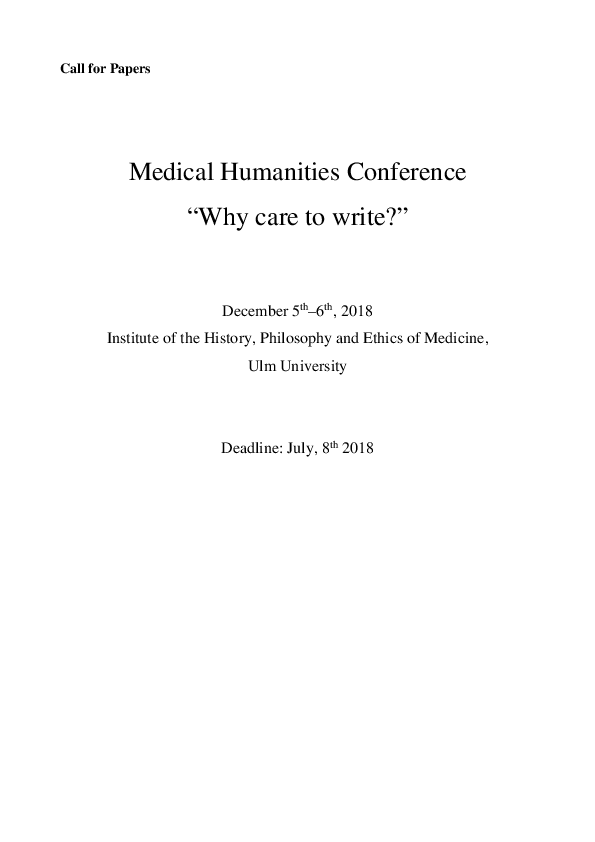Medical Humanities Conference “Why care to write?”
Few topics have shaped literature as much as illness, pain and dying. Already in antiquity, there were writers who dealt with medical issues, and healers who were literary active. Literature on health and illness offers special value for health care, as it can provide insights into subjective perspectives on health conditions and thereby lead to a holistic understanding of illness. Since the 1830s, a primary scientific orientation of medicine on the cell and later on molecular structures led to a strong specialization of medicine. In the course of this development, individual experiences of illness fell increasingly into oblivion. Only with anthropological medicine – one might particularly think of the works of Karl Jaspers (1883–1969) and Viktor von Weizsäcker (1886–1957) – did the subjective and social dimensions of illness come back to the center of attention. As a means of individual expression, literature can bring exactly this dimension of experience to mind. Fictional as well as biographical narratives of health and illness thus represent an important addition to scientific medicine. Today, there is plenty of such literature by writers as well as doctors and other actors in health care. Recent research in the field of narrative medicine has also increased the awareness for narratives of those affected, i.e. patients and their relatives.
This nexus of literature and medicine raises several questions: For what reasons do writers, patients, relatives and the various actors in the health care system deal with medicine through literature? Are these authors primarily interested in reflecting and processing their own experiences of illnesses with the help of the specific aesthetics of literature, or is writing rather a form of compensation or distraction? And what function and potential have these writings for society, literature and medicine? In other words: Why care to write?
The aim of our conference is to discuss, on the basis of literary, biographical and scientific sources, motives, reactions and effects associated with these interactions of literature and medicine. Methodologically and thematically, the conference is anchored in the field of “Medical Humanities”, i.e. between medicine and humanities.
For the conference, we especially invite proposals on the following subjects:
- Motives
- Reflections by writers, those affected, physicians and other actors in health care on their own writing, for example in diaries, biographies, essays, scientific discussions
- Reflections by writers, those affected, physicians and other actors in health care on their own writing, for example in diaries, biographies, essays, scientific discussions
- Reactions
- Social, medical and literary reactions to illness narratives, for example in reviews, blogs, essays
- Social, medical and literary reactions to illness narratives, for example in reviews, blogs, essays
- Effects
- Possible uses, functions and potentials of illness narratives for society, medicine and literature
Alternative topics of interest are also very welcome.
The conference aims to encourage interdisciplinary dialogue especially within the areas of literary studies, linguistics, cultural studies, psychology and medicine. The conference languages are German and English. Each paper will be allotted a 40-minute time slot (25 minutes presentation and 15 minutes discussion). Selected papers will be published in the conference proceedings after peer review. Abstracts of 500 words along with a brief bio-bibliography may be submitted until July 8th, 2018 to Katharina Fürholzer.
Organisation: Dr. Katharina Fürholzer, Univ.-Prof. Dr. Florian Steger, Institute of the History, Philosophy and Ethics of Medicine, Ulm University
Place: Institute of the History, Philosophy and Ethics of Medicine, Ulm University
Date: 4.– 6.12.2018

